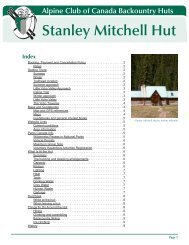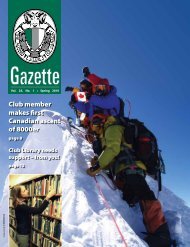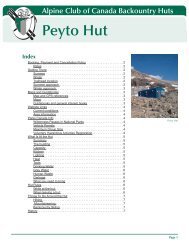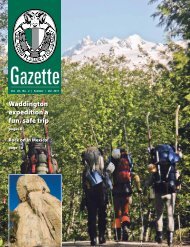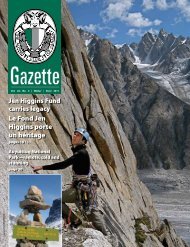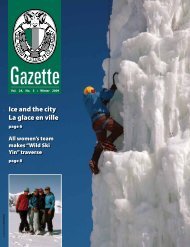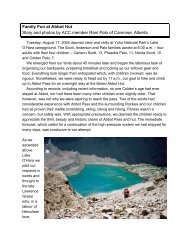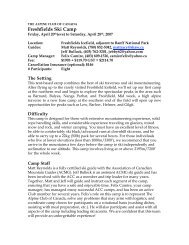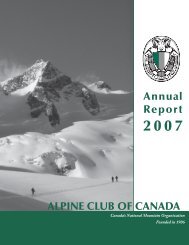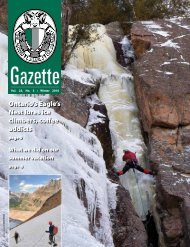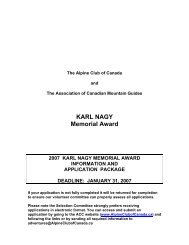A Passion for the Mountains - The Alpine Club of Canada
A Passion for the Mountains - The Alpine Club of Canada
A Passion for the Mountains - The Alpine Club of Canada
You also want an ePaper? Increase the reach of your titles
YUMPU automatically turns print PDFs into web optimized ePapers that Google loves.
Liability in <strong>the</strong> Backcountry<br />
by John Savage<br />
One<br />
<strong>of</strong> <strong>the</strong> most dangerous<br />
activities taken each day,<br />
without much thought, is driving an<br />
automobile. Driving an automobile is<br />
more dangerous than backcountry skiing<br />
or mountaineering, although life insurers<br />
don’t ask whe<strong>the</strong>r we are drivers. That said,<br />
as mountaineers or backcountry skiers we<br />
must be vigilant about many aspects <strong>of</strong><br />
safety and this has recently been highlighted<br />
by <strong>the</strong> deaths in British Columbia <strong>of</strong> 14<br />
backcountry skiers by avalanche near<br />
Revelstoke in January 2003.<br />
So what are <strong>the</strong> obligations and liabilities<br />
<strong>of</strong> guides and o<strong>the</strong>rs when taking to <strong>the</strong><br />
backcountry? <strong>The</strong> cornerstone <strong>of</strong> liability<br />
photo by John Derick<br />
10 <strong>Alpine</strong> <strong>Club</strong> <strong>of</strong> <strong>Canada</strong> ● Gazette ● Summer 2003<br />
and legal obligation is <strong>the</strong> duty <strong>of</strong> care<br />
owed our legal neighbours, <strong>the</strong> standards<br />
to which a guide or leader and organization<br />
must adhere and that will be applied when<br />
we join an <strong>Alpine</strong> <strong>Club</strong> <strong>of</strong> <strong>Canada</strong> (ACC)<br />
adventure.<br />
Contracts can protect and defi ne<br />
liabilities – and provide a useful reminder <strong>of</strong><br />
<strong>the</strong> dangers inherent in <strong>the</strong> activities we love.<br />
<strong>The</strong> ACC requires that participants in any<br />
activity sign a waiver and release <strong>of</strong> liability.<br />
This document draws <strong>the</strong> participant’s<br />
attention to <strong>the</strong> dangers involved in <strong>the</strong>se<br />
activities and releases <strong>the</strong> <strong>Club</strong>, its staff,<br />
leaders and guides from all liability whe<strong>the</strong>r<br />
or not attributable to negligence. But what<br />
are <strong>the</strong> legal consequences <strong>of</strong> signing a<br />
waiver?<br />
Waiver <strong>of</strong> Liability<br />
<strong>The</strong> waiver <strong>of</strong> liability most guides and<br />
organizations require recognizes that <strong>the</strong>re<br />
are inherent and sometimes unpredictable<br />
dangers associated with mountaineering.<br />
It is more than just a reminder, though,<br />
as it serves to protect <strong>the</strong>se individuals and<br />
organizations who dedicate <strong>the</strong>ir lives to our<br />
enjoyment <strong>of</strong> <strong>the</strong>se challenges. If liability<br />
were found, a single accident could easily<br />
bankrupt an individual or an organization.<br />
Without this protection, guiding as an<br />
activity and organizations promoting or<br />
facilitating mountaineering would be<br />
severely curtailed.<br />
In 1991 nine people were killed<br />
by an avalanche while heli-skiing in<br />
High Altitude Guide Training<br />
This<br />
summer, <strong>the</strong> International Federation <strong>for</strong> Mountain Guide Associations<br />
(IFMGA) is running its fi rst specialist course in high altitude guiding <strong>for</strong><br />
pr<strong>of</strong>essional mountain guides. <strong>The</strong> course will bring toge<strong>the</strong>r some <strong>of</strong> <strong>the</strong> most experienced<br />
high altitude mountain guides to provide pr<strong>of</strong>essional training <strong>for</strong> o<strong>the</strong>r guides wishing to<br />
lead parties at high altitude. <strong>The</strong> course is being held in Chamonix, France and is being<br />
organized by Steve Bell, president <strong>of</strong> <strong>the</strong> IFMGA High Altitude Working Group.<br />
“This course represents a very important step <strong>for</strong> <strong>the</strong> IFMGA as it will mean that <strong>the</strong><br />
IFMGA qualifi ed guides can add high altitude training to <strong>the</strong>ir pr<strong>of</strong>essional qualifi cations.<br />
Obviously, not all pr<strong>of</strong>essional mountain guides will want to lead parties at high altitude,<br />
but those who do now have a specialist training programme. This step by <strong>the</strong> IFMGA<br />
will help to promote good standards and will mean, as in o<strong>the</strong>r mountain ranges, that <strong>the</strong><br />
IFMGA badge is <strong>the</strong> pr<strong>of</strong>essional qualifi cation to look <strong>for</strong>,” Bell said.<br />
Bell is also <strong>the</strong> chairman <strong>of</strong> <strong>the</strong> International Guiding Organisations 8000 (IGO8000)<br />
and has helped to develop training opportunities <strong>for</strong> leaders and Sherpas in <strong>the</strong><br />
Himalayan countries. Such training is a vital part <strong>of</strong> developing appropriate standards <strong>for</strong><br />
commercial treks and expeditions and promoting sustainable development <strong>for</strong> mountain<br />
communities.<br />
<strong>the</strong> Bugaboos. Twelve skiers and <strong>the</strong>ir<br />
guide were beginning <strong>the</strong> last run <strong>of</strong> <strong>the</strong><br />
afternoon. <strong>The</strong> skiing conditions were<br />
spectacular. <strong>The</strong> skiers assembled at <strong>the</strong> base<br />
<strong>of</strong> <strong>the</strong> last run named Holy Shit. <strong>The</strong>y were<br />
going to ski Bay Street, which is made up<br />
<strong>of</strong> three shaped features converging about<br />
midway down <strong>the</strong> slope into one large route<br />
to <strong>the</strong> bottom. After <strong>the</strong> guide provided<br />
instructions and commenced leading <strong>the</strong><br />
group down, a tidal wave <strong>of</strong> snow swept<br />
everything be<strong>for</strong>e it. A textbook rescue<br />
was underway within minutes. All nine<br />
bodies were found within 45 minutes.<br />
Miraculously <strong>the</strong> guide survived.<br />
<strong>The</strong> guides and heli-skiing company<br />
were sued by one <strong>of</strong> <strong>the</strong> unhappy families.<br />
A waiver <strong>of</strong> liability had been signed by all<br />
<strong>the</strong> skiers, some <strong>of</strong> whom were not native<br />
English speakers. <strong>The</strong> courts have found<br />
that <strong>the</strong>re is no general requirement that a<br />
party tendering a document <strong>for</strong> signature<br />
take reasonable steps to apprise <strong>the</strong> signing<br />
party <strong>of</strong> onerous terms or to ensure that<br />
<strong>the</strong>y are read and understood. It is only<br />
where <strong>the</strong> circumstances are such that a<br />
reasonable person should have known that<br />
<strong>the</strong> party signing was not consenting to<br />
<strong>the</strong> terms that such an obligation in law<br />
arises. In this case <strong>the</strong> waiver had been<br />
sent by mail, it was written in English and<br />
<strong>the</strong> client was a <strong>for</strong>eign businessman who<br />
had an opportunity to read it or have it<br />
translated. By signing <strong>the</strong> waiver <strong>the</strong> Court<br />
found he was prepared to be bound by <strong>the</strong><br />
contract, whe<strong>the</strong>r he had actually read and<br />
understood it or not.<br />
<strong>The</strong> waiver was not misleading. It stated<br />
<strong>the</strong> dangers in frank terms. It warned <strong>of</strong> <strong>the</strong><br />
danger <strong>of</strong> avalanche. It expressly excluded<br />
liability <strong>for</strong> negligence. <strong>The</strong> court found that<br />
if <strong>the</strong>re was negligence it was covered by <strong>the</strong><br />
waiver and <strong>the</strong>re<strong>for</strong>e <strong>the</strong>re was no liability:<br />
Ocha v. Canadian Mountain Holidays Inc.<br />
et. al. No. C922041, Vancouver Registry,<br />
September 25, 1996.<br />
Waivers <strong>of</strong> liability are important and can<br />
be effective and have legal consequences. A<br />
properly framed waiver can exclude liability<br />
<strong>for</strong> negligence. But it is also remarkable<br />
how ineffective waivers are if negligence is<br />
demonstrated to a court.<br />
Negligence: Duty & Standard <strong>of</strong> Care<br />
Where <strong>the</strong>re is a duty <strong>of</strong> care, what is <strong>the</strong><br />
standard <strong>of</strong> care required <strong>of</strong> a guide that will



